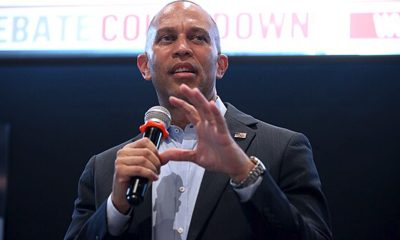Activism
With Union Contract OK’d, Moe’s Books Workers Get Improved Wages, Benefits
Despite some mixed feelings from workers about the owner’s reactions to the union, both workers and ownership expressed optimism about what they think the Moe’s Books union can do for the future of the four-story store with over 200,000 mostly used books. “If customers see the positive impact of shopping at independently owned stores that do all they can to support their workers,” said Moe’s Books owner, Doris Moskowitz, “then this agreement will only make Moe’s Books’ future stronger.”

By Zack Haber
Workers at Moe’s Books in Berkeley agreed to their first union contract with store ownership on November 23. The agreement has given them a $20 minimum wage, dental insurance, more paid vacation days, a new procedure for filing grievances, and job security protections.
“I think this is a good, solid contract, and a good starting point for improving worker/owner relations,” said Owen Hill, who’s worked at Moe’s for about 35 years. “I wish we had this 10 years ago, but better late than never.”
Moe’s Books owner, Doris Moskowitz, told this publication she’s happy with the contract as well.
“I feel great about the agreement,” said Moskowitz. “Supporting our workers is part of Moe’s 60-year legacy, and we are proud to continue in that tradition.”
In early March about 95% of eligible Moe’s workers agreed to form a union by joining with the Industrial Workers of the World (IWW). The move was part of a growth in bookstore unionization spurred by COVID-related issues.
Workers at Elliot Bay Book Company in Seattle and Bookshop Santa Cruz each formed unions in 2020. This year, bookstore unionization has expanded as workers at Printed Matter in New York City formed a union in October, while workers at three different Half Price Books locations in Minnesota are awaiting election results in mid-December to certify their unions.
Immediately after its formation, Moskowitz recognized Moe’s Books Union, but she had mixed feelings about it. In early April, she told Berkeleyside she “deeply respected” the workers’ decision to unionize but that the move had also left her “very sad and confused.” Following initial negotiations related to COVID safety measures, the union and Moskowitz began its first contract negotiations. In total, both sides came to 35 agreements during 16 bargaining sessions over eight months.
“The bargaining process was long, tiresome, and sometimes tense,” said Hill. “But mostly people were respectful and tried to come to an understanding.”
According to Bruce Valde, an organizer with the IWW who works with Moe’s Books Union, the eight months it took to agree to the contract was comparatively quick. In his experience, it usually takes workers and ownership a year to a year-and-a-half to agree to a first union contract. Valde called Moskowitz’s choice to immediately recognize the union “wise” and lauded the workers’ collaboration in clearly stating their requests.
“I think the workers diligence in actually forming our positions was excellent,” said Valde.
Since the new contract has passed, all union members will soon be getting a 10% raise in their salaries, or a $20 an hour wage if the 10% bump doesn’t already exceed that wage.
They’ll also get a 3% wage increase during the second and third year of the contract.
Additionally, the contract has stipulations related to respecting employees’ gender and gender expression. Harassment violations now specifically include ownership or management commenting in an ostracizing manner on workers’ gender expression, including clothing choices or hairstyles, or not making a concerted effort to correctly use workers’ pronouns.
While the union members unanimously agreed to the contract and Moskowitz told this publication “I feel like it is a win-win” situation, workers claimed along the way that the owner wasn’t always respectful of the union. In late September, union members and supporters held an informational picket at the store to support their demand for the $20 minimum wage that was eventually granted, but also to share information with the public about how they thought the owners were practicing “union busting.”
Around this time, the union filed unfair labor practice claims to the National Labor Relations Board, one of which was related to their accusation that Moskowitz was offering promotions for the sole purpose of removing people from the union by placing them in management positions.
Barry Bloom, who works as a book shipper, claimed Moskowitz asked him if he’d agree to be the supervisor of the shipping department, a position that would prevent him from joining in the union. He was the only member of the shipping department at the time, and she didn’t offer him a raise.
“My immediate reaction was to wonder ‘who would I be supervising?’” Bloom said. “I pretty much instantly saw it as a union-busting tactic.”
Moskowitz denied the accusation of union busting, saying, at the time “We have not made any job offer or offers of promotions in order to encourage any employee to break from their support of the union.”
Soon after agreeing to the new contract, Moskowitz taped a statement to the front window of the store, expressing that she was proud of the contract and Moe’s openness to organized labor. The statement, which was posted to Moe’s instagram and Facebook accounts, also encouraged other businesses, specifically large bookstores, to allow workplace organizing.
“If a small, independent used-book seller can accomplish this while keeping the doors open during a global pandemic,” the statement reads, “there is no reason for more lucrative companies to claim labor organizing will shut down their business or harm their employees.”
Two days after the statement appeared on Moe’s books social media sites, Moe’s Books union’s Twitter account put up a post stating “There’s a little revisionist history going on over at the boss’s social media site.”
While largely happy with the contract, Moe’s Books worker Phoebe Wong told this publication she’s uncomfortable with the owners’ actions immediately following its ratification.
“I’m really pleased and so proud of the work everyone put into doing the contract,” said Phoebe Wong. “But it’s been a long fight. And, to be honest, it makes me a little queasy to see ownership touting pride because it seems pretty dishonest considering the pushback we got.”
Despite some mixed feelings from workers about the owner’s reactions to the union, both workers and ownership expressed optimism about what they think the Moe’s Books union can do for the future of the four-story store with over 200,000 mostly used books.
“If customers see the positive impact of shopping at independently owned stores that do all they can to support their workers,” said Moskowitz, “then this agreement will only make Moe’s Books’ future stronger.”
“Moe’s now offers good wages, good benefits, and job protection,” said Hill. “I think we have a lot to offer to workers, and that we will be able to employ top quality people. I don’t think I’m being too dramatic when I say that the union saved the business.”
Activism
OP-ED: AB 1349 Puts Corporate Power Over Community
Since Ticketmaster and Live Nation merged in 2010, ticket prices have jumped more than 150 percent. Activities that once fit a family’s budget now take significant disposable income that most working families simply don’t have. The problem is compounded by a system that has tilted access toward the wealthy and white-collar workers. If you have a fancy credit card, you get “presale access,” and if you work in an office instead of a warehouse, you might be able to wait in an online queue to buy a ticket. Access now means privilege.

By Bishop Joseph Simmons, Senior Pastor, Greater St. Paul Baptist Church, Oakland
As a pastor, I believe in the power that a sense of community can have on improving people’s lives. Live events are one of the few places where people from different backgrounds and ages can share the same space and experience – where construction workers sit next to lawyers at a concert, and teenagers enjoy a basketball game with their grandparents. Yet, over the past decade, I’ve witnessed these experiences – the concerts, games, and cultural events where we gather – become increasingly unaffordable, and it is a shame.
These moments of connection matter as they form part of the fabric that holds communities together. But that fabric is fraying because of Ticketmaster/Live Nation’s unchecked control over access to live events. Unfortunately, AB 1349 would only further entrench their corporate power over our spaces.
Since Ticketmaster and Live Nation merged in 2010, ticket prices have jumped more than 150 percent. Activities that once fit a family’s budget now take significant disposable income that most working families simply don’t have. The problem is compounded by a system that has tilted access toward the wealthy and white-collar workers. If you have a fancy credit card, you get “presale access,” and if you work in an office instead of a warehouse, you might be able to wait in an online queue to buy a ticket. Access now means privilege.
Power over live events is concentrated in a single corporate entity, and this regime operates without transparency or accountability – much like a dictator. Ticketmaster controls 80 percent of first-sale tickets and nearly a third of resale tickets, but they still want more. More power, more control for Ticketmaster means higher prices and less access for consumers. It’s the agenda they are pushing nationally, with the help of former Trump political operatives, who are quietly trying to undo the antitrust lawsuit launched against Ticketmaster/Live Nation under President Biden’s DOJ.
That’s why I’m deeply concerned about AB 1349 in its current form. Rather than reining in Ticketmaster’s power, the bill risks strengthening it, aligning with Trump. AB 1349 gives Ticketmaster the ability to control a consumer’s ticket forever by granting Ticketmaster’s regime new powers in state law to prevent consumers from reselling or giving away their tickets. It also creates new pathways for Ticketmaster to discriminate and retaliate against consumers who choose to shop around for the best service and fees on resale platforms that aren’t yet controlled by Ticketmaster. These provisions are anti-consumer and anti-democratic.
California has an opportunity to stand with consumers, to demand transparency, and to restore genuine competition in this industry. But that requires legislation developed with input from the community and faith leaders, not proposals backed by the very company causing the harm.
Will our laws reflect fairness, inclusion, and accountability? Or will we let corporate interests tighten their grip on spaces that should belong to everyone? I, for one, support the former and encourage the California Legislature to reject AB 1349 outright or amend it to remove any provisions that expand Ticketmaster’s control. I also urge community members to contact their representatives and advocate for accessible, inclusive live events for all Californians. Let’s work together to ensure these gathering spaces remain open and welcoming to everyone, regardless of income or background.
Activism
Oakland Post: Week of December 31, 2025 – January 6, 2026
The printed Weekly Edition of the Oakland Post: Week of – December 31, 2025 – January 6, 2026

To enlarge your view of this issue, use the slider, magnifying glass icon or full page icon in the lower right corner of the browser window.
Activism
Big God Ministry Gives Away Toys in Marin City
Pastor Hall also gave a message of encouragement to the crowd, thanking Jesus for the “best year of their lives.” He asked each of the children what they wanted to be when they grow up.

By Godfrey Lee
Big God Ministries, pastored by David Hall, gave toys to the children in Marin City on Monday, Dec. 15, on the lawn near the corner of Drake Avenue and Donahue Street.
Pastor Hall also gave a message of encouragement to the crowd, thanking Jesus for the “best year of their lives.” He asked each of the children what they wanted to be when they grew up.
Around 75 parents and children were there to receive the presents, which consisted mainly of Gideon Bibles, Cat in the Hat pillows, Barbie dolls, Tonka trucks, and Lego building sets.
A half dozen volunteers from the Big God Ministry, including Donnie Roary, helped to set up the tables for the toy giveaway. The worship music was sung by Ruby Friedman, Keri Carpenter, and Jake Monaghan, who also played the accordion.
Big God Ministries meets on Sundays at 10 a.m. at the Mill Valley Community Center, 180 Camino Alto, Mill Valley, CA Their phone number is (415) 797-2567.
-

 Activism4 weeks ago
Activism4 weeks agoDesmond Gumbs — Visionary Founder, Mentor, and Builder of Opportunity
-

 Activism4 weeks ago
Activism4 weeks agoFamilies Across the U.S. Are Facing an ‘Affordability Crisis,’ Says United Way Bay Area
-

 Alameda County4 weeks ago
Alameda County4 weeks agoOakland Council Expands Citywide Security Cameras Despite Major Opposition
-

 Alameda County4 weeks ago
Alameda County4 weeks agoBling It On: Holiday Lights Brighten Dark Nights All Around the Bay
-

 Activism4 weeks ago
Activism4 weeks agoBlack Arts Movement Business District Named New Cultural District in California
-

 Activism4 weeks ago
Activism4 weeks agoLu Lu’s House is Not Just Toying Around with the Community
-

 Activism4 weeks ago
Activism4 weeks agoOakland Post: Week of December 17 – 23, 2025
-

 Black History3 weeks ago
Black History3 weeks agoAlfred Cralle: Inventor of the Ice Cream Scoop
















































